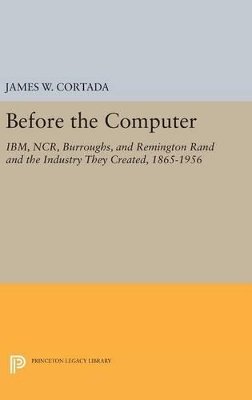
Stock image for illustration purposes only - book cover, edition or condition may vary.
Before the Computer: IBM, NCR, Burroughs, and Remington Rand and the Industry They Created, 1865-1956
James W. Cortada
€ 188.12
FREE Delivery in Ireland
Description for Before the Computer: IBM, NCR, Burroughs, and Remington Rand and the Industry They Created, 1865-1956
Hardback. Series: Princeton Legacy Library. Num Pages: 402 pages, black & white illustrations. BIC Classification: 1KBB; 3JH; 3JJ; KCX; KNA. Category: (P) Professional & Vocational; (U) Tertiary Education (US: College). Dimension: 235 x 155 x 22. Weight in Grams: 485.
Before the Computer fully explores the data processing industry in the United States from its nineteenth-century inception down to the period when the computer became its primary tool. As James Cortada describes what was once called the "office appliance industry," he challenges our view of the digital computer as a revolutionary technology. Cortada interprets reliance on computers as a development within an important segment of the American economy that was earlier represented largely by such instruments as typewriters, tabulating machines, adding machines, and calculators. He also describes how many of the practices of the office appliance industry evolved into those of the computer world. Drawing on previously unavailable industry archives, the author adds to our understanding of IBM's early history and offers short corporate histories of firms that include NCR, Burroughs, and Remington Rand. Focusing on the United States but also including comparative material on Europe and Asia, Before the Computer will be a unique source of knowledge about the companies that built office equipment and their enormous impact on economic life. Originally published in 1993. The Princeton Legacy Library uses the latest print-on-demand technology to again make available previously out-of-print books from the distinguished backlist of Princeton University Press. These editions preserve the original texts of these important books while presenting them in durable paperback and hardcover editions. The goal of the Princeton Legacy Library is to vastly increase access to the rich scholarly heritage found in the thousands of books published by Princeton University Press since its founding in 1905.
Product Details
Format
Hardback
Publication date
2017
Publisher
Princeton University Press United States
Number of pages
402
Condition
New
Series
Princeton Legacy Library
Number of Pages
402
Place of Publication
New Jersey, United States
ISBN
9780691630083
SKU
V9780691630083
Shipping Time
Usually ships in 15 to 20 working days
Ref
99-15
Reviews for Before the Computer: IBM, NCR, Burroughs, and Remington Rand and the Industry They Created, 1865-1956
"The computer didn't spring full-blown from the brows of men like Steve Jobs and Bill Gates. The automation movement that prepared the way for today's personal computer, the author shows, began in the 19th century with the invention of the typewriter and the adding machine."
Washington Post Book World "Easily the best attempt to date to integrate the present-day computer industry with its office machine past. It is strongly recommended as a significant contribution to the literature of the history of computing and the information handling industries."
Martin Campbell-Kelly, Business History "This beautifully produced book ... makes an essential contribution to the history of data processing and computing. Its data alone should make the book a basic reference for scholars."
Steven W. Usselman, American Scientist
Washington Post Book World "Easily the best attempt to date to integrate the present-day computer industry with its office machine past. It is strongly recommended as a significant contribution to the literature of the history of computing and the information handling industries."
Martin Campbell-Kelly, Business History "This beautifully produced book ... makes an essential contribution to the history of data processing and computing. Its data alone should make the book a basic reference for scholars."
Steven W. Usselman, American Scientist
